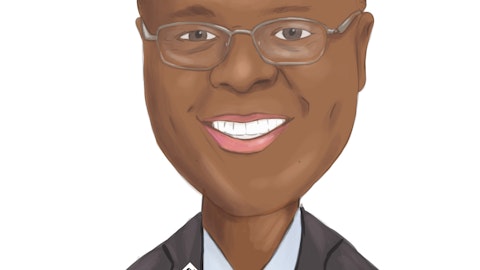This year, what we did in the fourth quarter is we took our trust core and our investment core and replace the incumbents with a new vendor that has a cloud-based solution that’s integrated as one solution for both of those cores. And then for this year, we’re hoping to do that with the banking core so that we’ve got ourselves in a place where all these things, even though they may not be able to talk to you to them, they’ll all to talk to our overlays much more effectively and efficiently, and we can get away from being stuck in a single vendors ecosystem and have a lot more flexibility for our system going forward. And the nice thing is with this trust investment vendor, we’re ending up, Julie, we finally breakeven is that — I mean, we’re hoping for some cost saves.
I think —
Julie Courkamp: breakeven, yes.
Scott Wylie: Yes. And we’ll see how — once the dust settles and everything if there’s some cost saves to be had there. But my point is, they’re not costing us more. There are some onetime conversion cost to it and obviously some pain to the conversion as there always is, but that would be kind of a short-term and long-term answer to that, Julie, what I miss in there.
Julie Courkamp: No, I think you got it. I was going to touch on the efficiency for our processes and simplification for our associates, client experience improvement and then more accessible data. So those are kind of the key points for what we are hoping to accomplish out of this one.
Scott Wylie: Yes. Did that answer your question, Bill?
Bill Dezellem: It does. That really sounds fantastic. Good what pulling all that together and thank you both.
Operator: Thank you. One moment please. And it looks like we do have a follow-up question from Brett Rabatin. Your line is open.
Brett Rabatin: Just wanted to follow back up on fee income and make sure I understood the expectations for the year, kind of seasonality, maybe of the risk management and insurance fees. And then, just thinking about mortgage banking, some folks have made some hard decisions on that business line. But my guess is you’re going to continue to try and work that business. So I just wanted to hear any thoughts around the mortgage expectations given, obviously, low levels at current times. Thanks.
Scott Wylie: Yes. So obviously, we’ve had some pretty tough headwinds in our fee businesses as an industry and here at First Western that’s true as well. The two big headwinds for our fee business has been on the mortgage side, and obviously, that was a big disappointment this year. But we know it’s cyclical. We know it’s strategic for us, like you said. So we’re not going to go out of it. What we can do is manage expenses, which we’ve done. We’ve cut expenses now Julie 2x or 3x?
Julie Courkamp: 3x.
Scott Wylie: Over the past 18 months?
Julie Courkamp: We’ll continue to assess that as production. We’re typically slower this season. So we’re definitely going to be assessing it as the months come in.
Scott Wylie: And then, we’ve added some MLOs in Arizona, in particular. So I think our production — our market share should improve MLOs are 100% commission. So there’s no expense associated with that, if they’re not producing and they are. So I think that’s kind of the best you can do with that, given what the market gives you. If the consensus assumption, I mean you look at the NPA numbers for this year, and I seem pretty aggressive to me. But if those come true, I mean, we should see a better year, at least or at least flat to last year, in mortgages. And if we have good expense control or when we have good expense control there. I mean they’re not going to get worse. It’s either going to be flat or get better, I think. And then on the asset management side, the trust and investment management side, we think there’s a ton of opportunity there.



